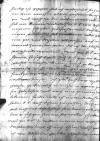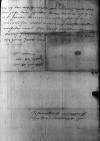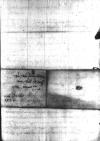Wans E(uer) L(ieb) nach allem yrem gefallen gluckselig und wol zustundt, auch frisch und gesundt weren, horet ich von hertzen gern und las E(uer) L(ieb) wyssen, das ich istz von den gnaden Gottes auch frisch und gesundt pin, / Gott hab lobe und geb lang, / damit mir palt enander mit freuden sehen mugen. /
So wyl ich E(uer) L(ieb) auch nit verhalten, das ich vergangens wynters umb dy weynachten auff der post zw ⌊keyserlicher maiestet⌋ hab mussen reythen, / und alda glucklich und wol ankomen, / fir menet warten hab mussen, ehe ich abgefertigt pin word(en), / und wyderumb gluckselig und wol gen ⌊Meintz⌋ ankomen.
Wenig thag alda verharret, / ist dy greffin von Roschefordt alias junffra ⌊Els von Osterreych⌋ zw mir komen und acht thag in meyner behaussung pey mir pliben, / damir gutter thing gebesen, / und E(uer) L(ieb) offt zw uns gebunscht haben, / von alter kuntschafft und geschelschafft weg(en). Hat mich sunderlich gepeten, wo ich potschafft zw E(uer) L(ieb) bekeme, das ich dy selb von iretbegen wolt grussen, / das ich hymit alsodt ausgericht wyl haben. / Und wy ⌊sy⌋ wyder von mir  AAWO, AB, D.95, f. 141v hinbeg ist gezogen, hab ich wyderumb hieher gen ⌊Rom⌋ mussen eylentz postiren, / do ich [...] hidden by binding⌈[...][...] hidden by binding⌉ pin, / und mich in den melonen wol erkul[...] hidden by binding⌈[...][...] hidden by binding⌉. Hab nit kunnen underlassen E(uer) L(ieb) mit dysen meynem schreyben zu besuchen und derselben meyne gelegenhat hab zuerkennen wellen geben hidden by binding⌈[en]en hidden by binding⌉ mit pit, mir derselben gelegenhat auch wy hidden by binding⌈[y]y hidden by binding⌉derumb zuversten geben, der ich dan hertzlich hidden by binding⌈[ch]ch hidden by binding⌉ gern wolt vernemen. /
AAWO, AB, D.95, f. 141v hinbeg ist gezogen, hab ich wyderumb hieher gen ⌊Rom⌋ mussen eylentz postiren, / do ich [...] hidden by binding⌈[...][...] hidden by binding⌉ pin, / und mich in den melonen wol erkul[...] hidden by binding⌈[...][...] hidden by binding⌉. Hab nit kunnen underlassen E(uer) L(ieb) mit dysen meynem schreyben zu besuchen und derselben meyne gelegenhat hab zuerkennen wellen geben hidden by binding⌈[en]en hidden by binding⌉ mit pit, mir derselben gelegenhat auch wy hidden by binding⌈[y]y hidden by binding⌉derumb zuversten geben, der ich dan hertzlich hidden by binding⌈[ch]ch hidden by binding⌉ gern wolt vernemen. /
Und pit E(uer) L(ieb) an[...] hidden by binding⌈[...][...] hidden by binding⌉ hymit so sich begebe, das E(uer) L(ieb) pey der ⌊koni hidden by binding⌈[i]i hidden by binding⌉glichen maiestet⌋ kemen, / mich yr koniglicher hidden by binding⌈[cher]cher hidden by binding⌉ maiestet auffs underthenigest pefellenn sambpt erpitung meyner underthenigen wylligen dinst(en). / Ich pin auch lang wyllens hidden by binding⌈[ns]ns hidden by binding⌉ gebesen, yr ⌊koniglich maiestet⌋ in eygener per hidden by binding⌈[r]r hidden by binding⌉son zu besuchen und mich mit yr maiestet bekennen, / furder wolt ich nit underlassen haben, E(uer) L(ieb) auch daheim zu besuchen, / darzu mir hidden by binding⌈[ir]ir hidden by binding⌉ Gott noch wel behulfflich sein, damitz palt geschehe hidden by binding⌈[ehe]ehe hidden by binding⌉, dan es sich pishere nit hat wellen schicken.
Und pit E(uer) L(ieb) dywellen meyner nit vergessen, dergleychen wyl ich auch thun, / und so palt ich von ⌊bebstlicher heylikat⌋ abgefertigt werde hidden by binding⌈[de]de hidden by binding⌉  AAWO, AB, D.95, f. 142r zey ich den negst(en) wyder gen ⌊Meintz⌋. Wolt Gott, das sichs dan schicken kunt, damit ich zw E(uer) L(ieb) hynein komen mocht. / Hab ich E(uer) L(ieb) freuntlicher gutter manung nicht wellen verhalt(en) und thue mich derselben hymit gantz freuntlich pefellen.
AAWO, AB, D.95, f. 142r zey ich den negst(en) wyder gen ⌊Meintz⌋. Wolt Gott, das sichs dan schicken kunt, damit ich zw E(uer) L(ieb) hynein komen mocht. / Hab ich E(uer) L(ieb) freuntlicher gutter manung nicht wellen verhalt(en) und thue mich derselben hymit gantz freuntlich pefellen.
 AAWO, AB, D.95, f. 141v hinbeg ist gezogen, hab ich wyderumb hieher gen
AAWO, AB, D.95, f. 141v hinbeg ist gezogen, hab ich wyderumb hieher gen  AAWO, AB, D.95, f. 142r zey ich den negst(en) wyder gen
AAWO, AB, D.95, f. 142r zey ich den negst(en) wyder gen 


